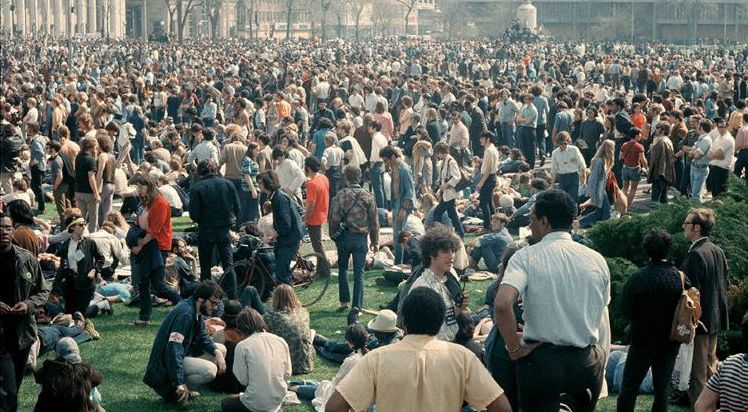Authors:
Historic Era: Era 10: Contemporary United States (1968 to the present)
Historic Theme:
Subject:
June 2020 | Volume 65, Issue 3


Authors:
Historic Era: Era 10: Contemporary United States (1968 to the present)
Historic Theme:
Subject:
June 2020 | Volume 65, Issue 3
Editor’s Note: In May 1970, my Yale classmate, Henry Louis “Skip” Gates, Jr., and I watched National Guard soldiers roll heavy tear-gas machines across the historic New Haven Green. The compressors emitted a loud hum as they pushed clouds of stinging smoke toward a crowd protesting the trial of Black Panther leader Bobby Seale.
Radicals in the Weather Underground had threatened to set off bombs. We were terrified they would destroy Yale’s post office and phone system, which happened to be directly under my first-floor dorm room. (Later that week, two bombs did detonate a half mile across campus at Yale’s Ingalls hockey rink, but no one was hurt.)

As tear gas billowed across the green and soldiers in battle gear moved toward us, I ran up the street to my dorm, knowing that the armband identifying me as a “student marshal” wouldn’t protect from arrest. Hurrying through the gate into Saybrook College, I was shocked to hear low, droning sounds coming from inside the courtyard. Tear gas here, too? But the hum turned out to be not a compressor, but the poet Allen Ginsberg repeating an Om mantra into a megaphone to calm students. A few days later, the relative success of the New Haven protests was overshadowed by the tragic shootings at Kent State.
I’m delighted that Skip agreed to recall for American Heritage those tense days and the successful efforts to defuse what could have been a more unfortunate situation. In recent weeks, authorities across the U.S. could have learned from the leaders of 1970 how to listen, empathize, and defuse a protest, rather than inflame it.
Skip Gates has had a distinguished career since as historian, literary critic, department chair at Harvard, and television interviewer and producer of the wonderful PBS series Finding Your Roots. He adapted the following from an essay he wrote as the introduction for the book May Day at Yale, 1970: Recollections: The Trial of Bobby Seale and the Black Panthers by Sam Chauncey, the brilliant Yale administrator who played a key role in the events of those days.
—Edwin S. Grosvenor
On the eve of May Day, 1970, a nation weary of a war increasingly perceived as immoral and rocked by ongoing racial tensions still raw from the assassination of Martin Luther King, Jr., awaited Armageddon in perhaps the most unlikely place of all: on the campus of Yale University in downtown New Haven, Connecticut, where I was a sophomore.
Our expectations were that a mass demonstration of college students, black and left-wing radicals, and perennial “outside agitators” would sweep over the green in protest over the jailing and unfair